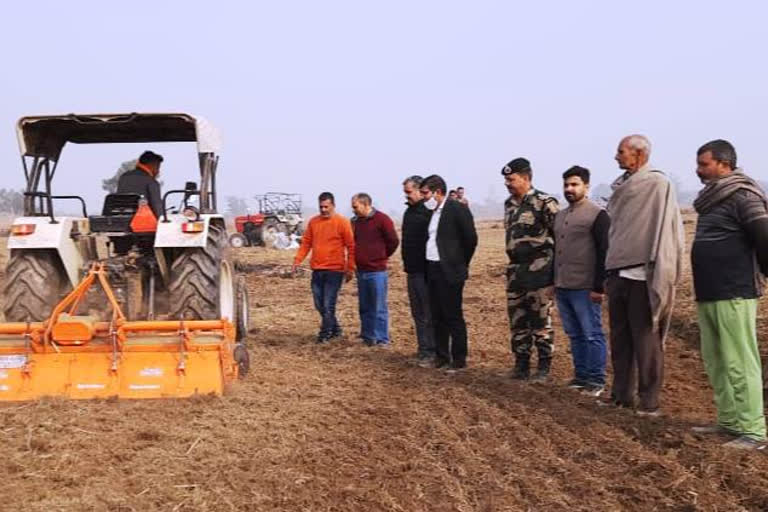Kathua (J&K): Farmers in Jammu and Kashmir's Hiranagar sector along the International Border (IB) have slowly but surely started to return to their fields after India and Pakistan announced a truce on February 25, 2021.
The persistent skirmishes between the two countries had turned over 5,000 acres of land fallow along the International Border spread across 22 villages in the Hiranagar sector.
The entire belt had seen the growth of unwanted bushes which posed a threat to the Border Security Force (BSF) since the same obstructed the vigil on the intruders.
The J&K Agriculture Department with the help of BSF roped in bulletproof tractors and other logistics to clear the weeds in the huge area.
Also read: Narcotic cases on the rise in Kashmir, discloses IGP Vijay Kumar
After days of hard work to clear the area, rounds of tilling in the almost barren land, around 90 acres of land was successfully cultivated by sowing wheat.
This attempt by the authorities yielded produce of 185 quintals of wheat as a reward for their efforts to make a congenial atmosphere for farming activity.
It also worked as a confidence-building measure for farmers who until then were apprehensive of returning to their lands.
The UT administration made concerted efforts to bring farmers on board and held several rounds of meetings with all stakeholders, an official said.
“Initially, the idea of resuming cultivation in border farmland received a cold response from the farming community as they were reluctant owing to uncertainty and apprehension regarding ceasefire violation from the Pakistani side,” the official said.
A team from agriculture and revenue departments was detailed to provide support to the farmers under the security of the BSF, he added.
Also read: J&K leaders put under house arrest
“A framework was also devised to ensure smooth access to the farmers on the zero line who were reeling under the constant threat of shelling from across the border,” the official said.
Deputy Commissioner, Kathua, Rahul Yadav and BSF Commandant, Atul Shah accompanied by Chief Agriculture Officer, Kathua Vijay Upadhyaya had visited Border Out Post (BoP) Chandwan on the forward line along the IB and to oversee the sowing of wheat crops on zero line.
Yadav said under the direction of Lieutenant Governor Manoj Sinha, the administration provided all logistic support to farmers to encourage them to cultivate their fields on the forward line.
“We have a target to cultivate nearly 247 acres (100 hectares) of land this season and the rest of the area would be covered later,” he said.



